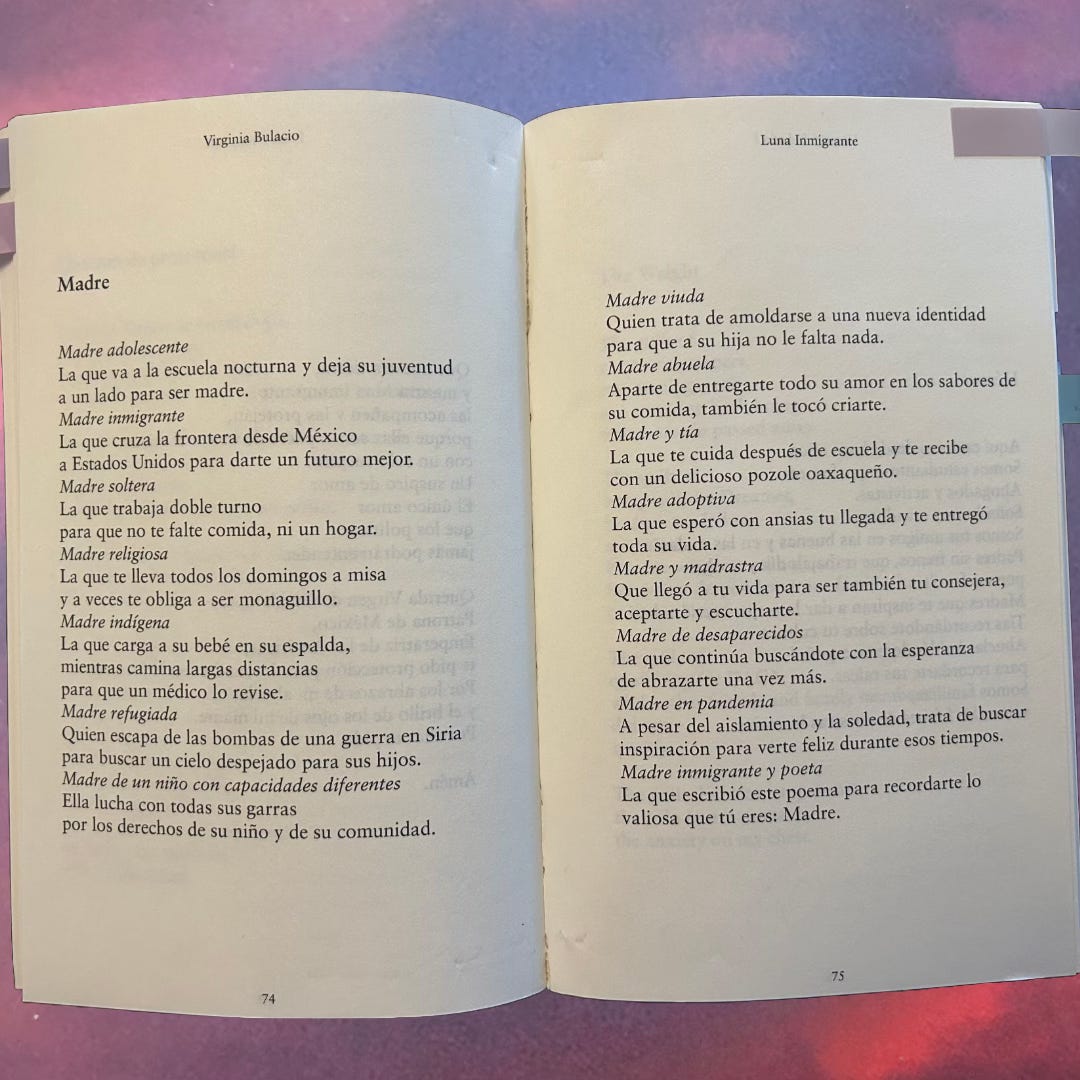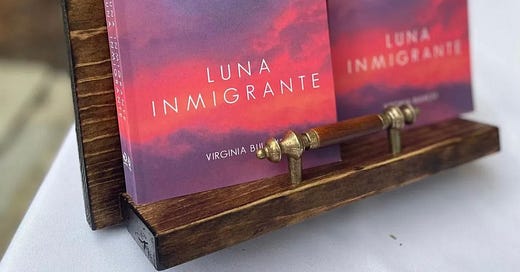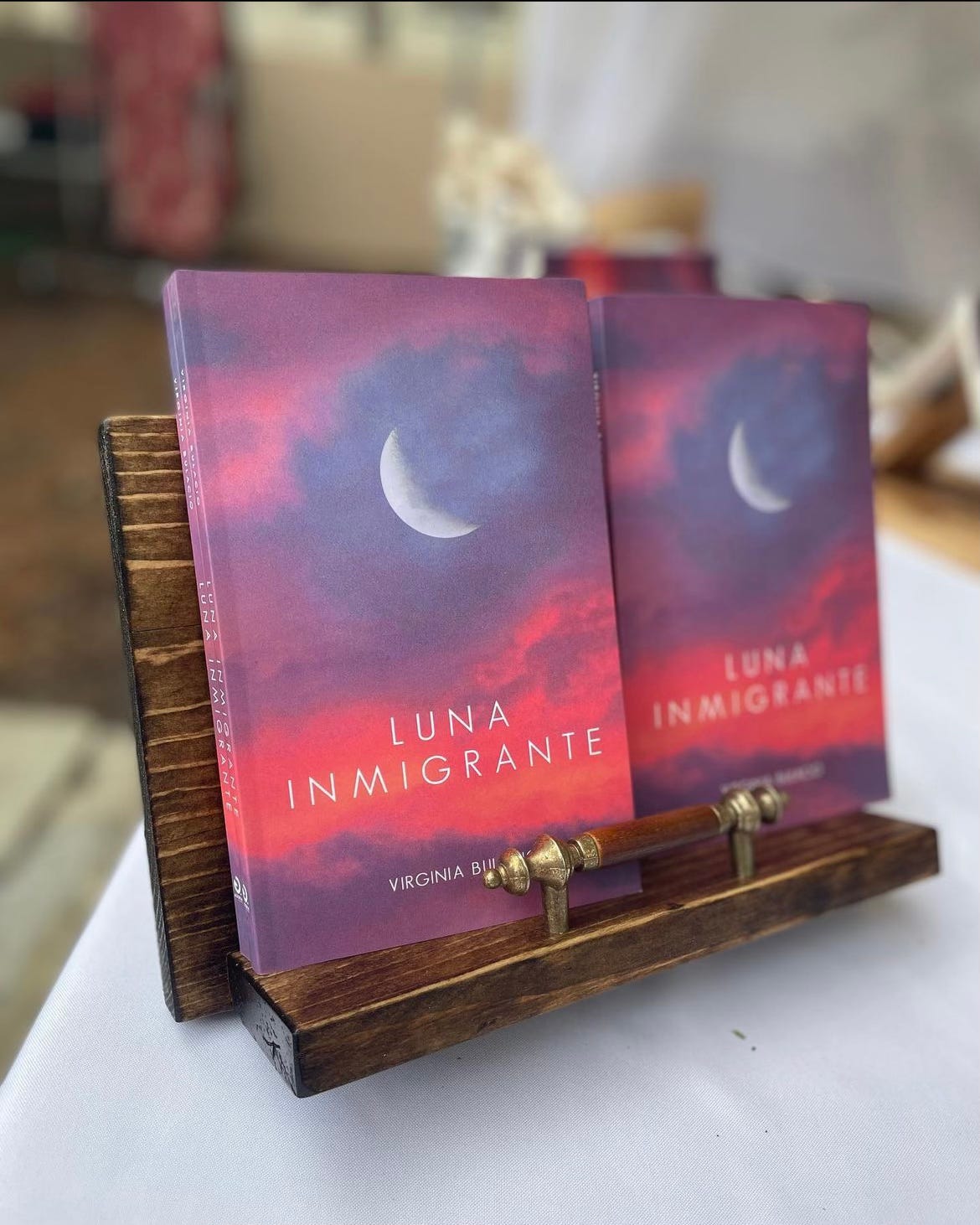I think it is important to mention that I did this interview on a full moon. That was not intentional, but it was also not a coincidence. Like how it wasn't a coincidence that I walked into my local bilingual bookstore, Palabras, for an author reading and found Luna Inmigrante on a shelf. It was the pink clouds and the purple sky on the book cover that first drew me in.
The title, Luna Inmigrante, was at first two separate words with entirely different meanings. Luna, is my daughter’s name. A name I gave her when very early in my pregnancy, I was so certain she was Luna that I didn’t bother to look for any other names. A name that I chose because of my deep connection to that mystical and magical being in the sky. I knew my unborn child, I felt, in the same way I knew La Luna, deeply. As if we had always been together through several lifetimes. And we were meant for each other through every lifetime. And in this one mi Luna was meant for me again, as my daughter, born on a scorpio moon.
Inmigrante is another form of categorization that the US government and western society has placed upon our bodies to push us further down the hierarchal structures meant to oppress us. Inmigrante, has also been taken back by the very people who have been labeled as such to mean so much more. And so to me, to be un inmigrante is to be resilient, it is to be a seed in the soil growing, a seedling, a flower blooming where it was not meant to survive, but is thriving. To be an Immigrant, is to know home within oneself and to move forward in all the phases, all the changes to immigration policies meant to rip us out.
I held Virginia Bulacio’s poetry collection, Luna Inmigrante, in my hands and I opened up the book to her poem “Madre”. No, that also wasn’t a coincidence. It felt divine. I took it to the counter immediately, purchased my copy then took my place in the reading room to wait for the author to arrive as I continued to flip through her poems. Virginia and I connected on Instagram that evening after I posted her book in my stories. She followed me back on instagram and then sent me one of my posts, the one of the first essay I wrote for La Cuenta “Mothering as an Undocumented Woman in America.” She shared that she connected to that piece I wrote and I told her how moved I was by her. In that moment my DMs felt sacred, divine.
So, on this full moon, Virginia and I delved into the process of writing Luna Inmigrante, and how the energy of la Luna inspired her and continues to guide her as a woman, an artist, a mother and an immigrant from Argentina.
Welcome to part one: Luna Inmigrante Welcomes You Home
CHRISTIAN PENA: Thank you for meeting with me, I know you have to pick up your son from school soon so I will try not to keep you so long.
VIRGINIA BULACIO: Yeah, of course and if you need more time, we can also meet tomorrow if you have time. Whatever works for you as well.
CP: Perfect. I wanted to dive in and discuss your beautiful poetry collection, Luna Inmigrante. I found the energy of the poetry, and really the entire book from the cover to the title of the collection, to be incredibly comforting. Is this something that was intentional or sort of just came together that way?
VB: Yeah, wow. First of all thank you for sharing that, because when we’re writing, we don’t really know how much impact we can have on others. So yes, that was my goal. I wanted Luna Inmigrante to be on someone’s desk, or la mesita de luz¹, within reach whenever they needed it.
I wanted people to feel welcome. In fact in the introduction, I sign off with “welcome home,” And I think part of me writing that — it’s something that as immigrants we sort of have to endure. These feelings of not being welcomed, or wanted in this country. Especially right now with the political discourse and everything that is happening at the border. We don’t really get that welcoming. So, I thought to myself, I want people, no matter what their circumstances or what they are going through as immigrants or refugees from another country to feel like, “Luna Immigrante welcomes you home.”
I think that was the energy that I wanted to channel into the book. And I have always looked at the moon as a sort of madrina, that is guiding me.
In the introduction, I sign off with “welcome home,” And I think part of me writing that — it’s something that as immigrants we sort of have to endure. These feelings of not being welcomed, or wanted in this country.
CP: That is incredibly beautiful. Thank you for that welcoming because it made me feel at home within the pages of your poetry. I also really appreciate how not only did you title this with la luna in mind but you really incorporated the energy of the moon and captured that loving, strong feminine energy. Was that intentional or did you unconsciously begin to channel that energy as you put together the book?
VB: As I was writing about La Luna, I began to write it from the perspective of — how would La Luna communicate with us? And when I began putting this book together it was during the pandemic and I had just become a mom, I was figuring out this role, this new phase in my life. So I began to write from this new inner world and in working with the energy of the moon it just felt natural to want my readers to feel welcome like a mother might make you feel welcome.

CP: It’s so interesting that you say that because when I picked up the book, the book naturally flipped to the poem Madre — I mean as soon as I opened it. Initially I was drawn to the colors on the cover and the title because I have a daughter named Luna, and then after reading that I was like, “Hey Universe I hear you and I’m taking it.”
VB: No! Oh my goodness. Wow, I continue to find stories like this — human connections to this book that I wrote. And sure I wrote it but I think it’s bigger than me. I did a reading not that long ago of one of my poems and there was one person in the audience that was from Argentina and she had a lot of connections to the poem.
It’s incredible how when we really connect to our most human emotions and when we really have, como una buena vibra para lo que unto tiene que hacer como que siento que el Universo se encarga de regalarnos momentos haci.²
So you said your daughter’s name is Luna, how old is she?
CP: She is five years old. And just like you said La Luna in my mind has always been this comforting energy throughout my life but I think especially when I was a teenager. So when I was pregnant with my daughter, it was like I immediately knew that she would be Luna. And initially this is what drew me to your book but as I began to read it I felt this motherly divine feminine energy coming from your poetry and it moved me.

VB: Wow, it’s nice that you mention that. I did want it to feel like feminina y luchadora, con consejos³ — if that makes sense? I have tried to include, not just my own stories but stories of my grandmothers, y mis tias⁴. I grew up with a lot of mujeres that are immigrants, y algunas con papeles unas sin papeles⁵. Y siempre sentia esa energia feminina y luchadora.⁶ I really admire the strength that immigrant women carry. Muchas etapas que pasar de ser mujer de ser niña de ser adolescente de ser mama y de ser inmigrante.⁷ And when you’re an immigrant you carry so much and yet you are still able to give and provide, and to give love to others and understand them. I find that so wonderful.
Notes/translations 1. the side table 2. like when we have good energy for what one is meant to do, I feel like the Universe provides us with special moments like this. 3. feminine, strong with advice 4. and my aunts 5. and some that are undocumented and some that are not. 6. And I have always felt this strong, feminine energy. 7. There are so many phases that come with being a woman, a young girl an adolescent, of being a mother and an immigrant.
Propina
We will be back next week with the second half of this interview. In the meantime check out Virginia’s instagram (@virginiabulacio) for upcoming Luna Inmigrante poetry readings at the Melrose Trading Post on Sundays.
Virginia is also fundraising for Al Otro Lado , a bi-national organization providing no-cost legal and humanitarian aid for deportees, refugees and separated families. If you are able to donate you may do so here.






